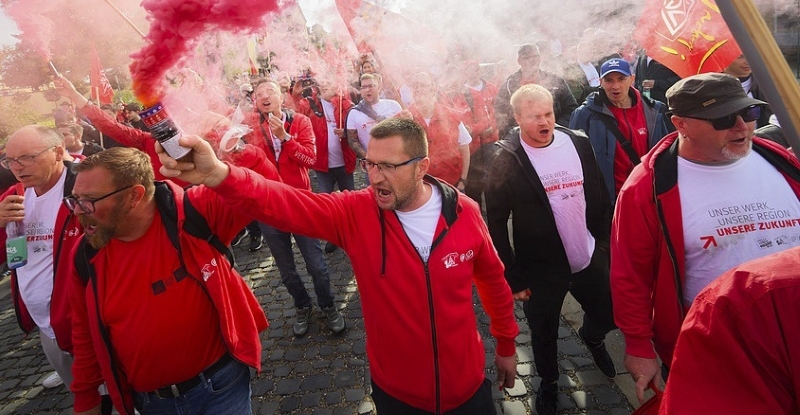Recently, the European Union proposed final countervailing duties on electric vehicles from China, drawing public opposition from Germany’s three major automakers, including Volkswagen Group. European media have viewed the EU’s decision as a double blow to Germany’s auto industry. Last month, Volkswagen announced it is considering closing an auto manufacturing plant and a parts factory in Germany, ending an employment protection agreement in place since 1994. This is reportedly the first time since Volkswagen’s founding in 1937 that it has considered closing a domestic factory. On September 25, amid protests from Volkswagen employees, the company and labor unions entered a three-hour collective negotiation, with German media describing the talks as “deadlocked” and “far apart.”
Germany’s manufacturing sector is world-renowned for its high quality, precision, and reliability. The country is one of the world’s leading manufacturing powers. However, in recent years, with weak global demand and rising labor and energy costs, even a manufacturing powerhouse like Germany has struggled. Many German companies are increasingly worried about the future. It is reported that several German mechanical manufacturing giants are accelerating their shift toward smart manufacturing and green energy, especially by enhancing partnerships with foreign companies, including those in China. This direction is seen as beneficial for both Germany and Europe’s automotive industry transformation and may reflect a broader shift for the future of German manufacturing.
Declining Orders and Production
On September 25, Volkswagen’s official website published a statement explaining its position during the talks: “The situation at our German headquarters is extremely serious. In the face of rising costs and competitive pressure, Volkswagen must prepare for the future to secure its position as a leading manufacturer. Only by continuously reducing costs, improving efficiency, and increasing productivity can we invest in new technologies and products to ensure long-term employment.”
On the other side, IG Metall, Germany’s largest labor organization, made it clear before the negotiations that “we will not discuss factory closures or large-scale layoffs.” Union negotiators described these as “clear red lines.” According to Der Spiegel, IG Metall requested more details about Volkswagen’s cost-cutting measures proposed last year. As of now, apart from terminating some collective agreements, Volkswagen has not provided any specifics on layoffs or factory closures, leaving unions dissatisfied. There is a possibility of strikes in December.
According to Reuters, Volkswagen’s market value has shrunk by nearly a third over the past five years, making it the worst performer among Europe’s major automakers. Volkswagen is Germany’s largest employer and Europe’s biggest carmaker. The report suggests that Volkswagen’s consideration of closing factories in Germany for the first time is a blow to German Chancellor Olaf Scholz and reflects the deteriorating outlook for Germany’s economy. Carsten Brzeski, head of macroeconomics at ING, stated that Volkswagen’s latest decision underscores the consequences of Germany’s economic stagnation and lack of structural reforms over the years.
This Struggle Isn’t Limited to Volkswagen
This latest situation is not unique to Volkswagen. According to Die Welt, from January to July this year, Germany’s machinery manufacturing industry experienced a further decline in production and orders. The German Mechanical Engineering Industry Association (VDMA) adjusted its production forecast, raising the expected decline from 4% to 8%. A report from the Munich-based Ifo Institute for Economic Research indicated that the capacity utilization rate in Germany’s machinery manufacturing industry is currently only 79.4%, down from 88.8% last year. The institute noted that nearly half of German machinery manufacturers face overcapacity and excess staffing issues.
Ralph Wiechers, chief economist at VDMA, stated, “The past year has been tough, with mixed results.” He explained that orders in Germany’s machinery manufacturing industry have dropped by 12% compared to last year. In key markets like Europe, the United States, and China, there is a lack of confidence in long-term global economic growth. However, Wiechers is not overly concerned, noting that mechanical engineers are “used to the ups and downs of economic cycles.”
Wiechers added, “The impact of the decline in orders is still manageable. Most companies are still processing backlogged orders from previous years, but the post-pandemic surplus will soon be exhausted. Many customers in the machinery and equipment manufacturing sector are under tremendous pressure to transform, largely due to high energy costs, which will have a profound and unavoidable impact.”
Looking ahead, Wiechers remains cautious about the prospects for German machinery manufacturing companies, stating, “The focus is on exports, and we are seeing signs of a rebound in overseas orders. However, domestically, the downward trend in orders is not likely to reverse.” The Kiel Institute for the World Economy (IfW) holds a similar view, predicting that Germany’s GDP growth rate will be just 0.9% this year.
A VDMA survey in June showed that nearly half of German machinery manufacturers do not expect stronger growth momentum by 2025. Of the 932 companies surveyed, about 30% rated their current situation as “bad” or “very bad,” while 29% described it as “good” or “very good.” More than half of the companies expressed pessimism about 2024, with nearly 40% expecting a decline in sales this year, and about a quarter anticipating economic stagnation.
The ongoing economic slowdown is also affecting labor demand in the manufacturing sector. Nearly half of the surveyed companies stated they would reduce the number of short-term laborers in the next six months, and many have introduced shorter working hours. For instance, TRUMPF, a German company, announced that it would reduce working hours and cut wages by 10%, affecting over 500 employees at its Ditzingen headquarters. Even major suppliers like Volkswagen are facing potential layoffs.
EU Tariffs: ‘Another Blow’
The success of German manufacturing is deeply tied to its specialized technologies and niche markets. Many German manufacturers started as family businesses, focusing on niche fields with extensive experience and strong brand recognition. According to Germany’s Tagesschau, despite weak demand, highly specialized German companies continue to do well in emerging markets with higher growth rates.
For example, the German pump and valve group KSB, based in Frankenthal, maintained strong momentum in 2023 due to its high level of specialization. KSB reported a 3.4% growth in orders and a 9.5% increase in sales. KSB’s CFO Matthias Schmitz explained that the company’s products, particularly in the chemical and energy sectors, continue to be in high demand globally. Meanwhile, the company has seen solid growth in overseas markets, especially in Brazil, India, and China, as well as some growth in the U.S. market.
Schmitz noted that the company’s growth is closely tied to favorable market conditions in South America and China. He expressed hope that Germany’s federal government would provide strong support in financing and energy transition policies. KSB plans to invest 80 million euros in more energy-efficient production methods using district heating and photovoltaic systems, but financing is still required. After Germany’s Federal Constitutional Court overturned the government’s budget plan last year, it remains unclear whether previously promised subsidies will be available.
Looking Ahead: Growth Through Innovation
German manufacturing is undergoing technological innovation to remain globally competitive amid stagnant growth and rising energy costs. Companies like Volkswagen, Bosch, and Siemens are leading the charge in transitioning to smart manufacturing and green energy. Partnerships with foreign companies, including those in China, are playing a key role in addressing climate change and the digital revolution.
For example, Siemens’ digital factory in Amberg has become a global model for Industry 4.0, using its MindSphere IoT system to optimize production processes and increase equipment utilization. As German manufacturing continues its transformation, the focus on innovation, digitalization, and green energy will likely define its future competitiveness in a global market.













Leave a comment